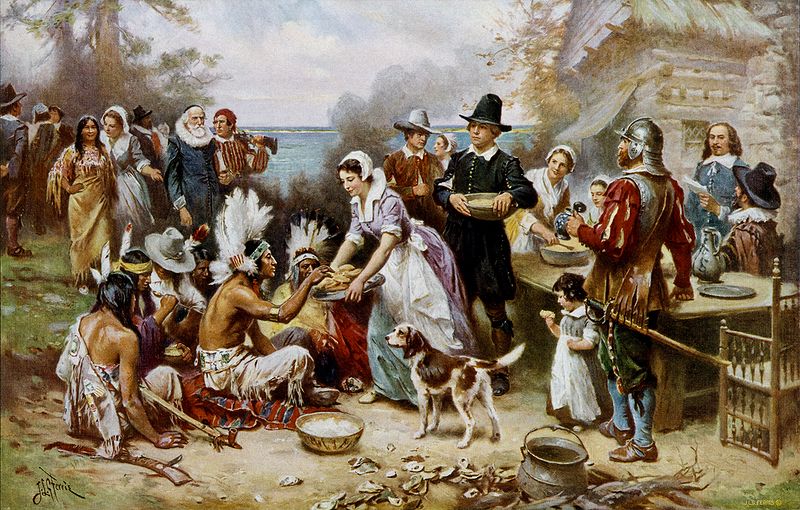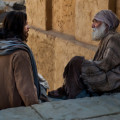As November wanes, many people start thinking about Black Friday and what’s going on sale and what they need to do to get ready for Christmas. And Thanksgiving begins to feel like the holiday between Halloween and Christmas. But really, Thanksgiving is a great beginning to the Christmas season because instead of thinking about the hustle and bustle of gift buying and presents, we focus on our blessings and the things for which we are grateful. Gratitude is a powerful tool. Members of The Church of Jesus Christ of Latter-day Saints believe that gratitude to God is an essential part of living the gospel of Jesus Christ. The power of giving thanks is that it inspires us to do better and to be better. And it is an attitude and a way of life that will stay with us throughout the year if we let it.
The Spirit of Giving Thanks
Our modern holiday of Thanksgiving is an homage to the sacrifice, faith and fortitude of the Pilgrims who helped to settle the New World. They celebrated their first feast of thanks in 1621 after their first harvest. But it took on a new meaning two years later when they celebrated their harvest after several months of drought. They trusted in God to help them, and He did. The spirit of giving thanks is one of gratitude. Elder Sterling W. Sill said,
We have an interesting custom among us in which we set aside special days to think about special things. … In the month of November we set aside the fourth Thursday as Thanksgiving. On this day we try to build gratitude and appreciation into our lives. And as we recount our blessings we increase them. Cato, the great Roman philosopher, once said that gratitude is the mother of virtues. That is, virtues have parents the same as people do, and a thankful heart can produce the most profitable posterity. And we might well join with Shakespeare as he prayed, “Oh God who lends me life, lend me a heart replete with thankfulness” (Thanksgiving, BYU Speeches, Nov. 11, 1975).
It’s important to remember to whom we are giving thanks on this special day. Dee F. Andersen, at the time administrative vice president of Brigham Young University, said,
Thanksgiving Day has always been designed to be a religious experience, a day to know the Lord and bless his name.
[In 1621], Governor William Bradford declared a three-day fast, and a small group of pilgrims gathered to “worship and give thanks to God.” Two years later, in 1623, on July 30, the first official Thanksgiving Day was set up for “the special purpose of prayer.” During the revolutionary war there were some eight special days of thanks, which were observed for “special blessings that had been received.” On November 26, 1789, more than 100 years after the first special day of prayer, President George Washington issued a special proclamation for a day of “giving thanks.” And about 100 years later in 1863 President Abraham Lincoln designated the last Thursday in November as “a day of thanksgiving and praise to our benevolent Father.” Now, after more than three and a half centuries, we still celebrate a “Thanksgiving Day” (Thanks-Living, BYU Speeches, Nov. 26, 1985).
The spirit of giving thanks is found when we turn our hearts to God and acknowledge the blessings that He has bestowed upon us. Although we set aside a national day of thanks, the spirit of giving thanks can remain with us throughout the year. And we can begin at any time.
The Power to Change Hearts
It’s easy to get caught up in the stresses, trials and minutiae of everyday life, which can lead to dissatisfaction and frustration— especially during the tough times. But gratitude can change that. President Dieter F. Uchtdorf taught,
Everyone’s situation is different, and the details of each life are unique. Nevertheless, I have learned that there is something that would take away the bitterness that may come into our lives. There is one thing we can do to make life sweeter, more joyful, even glorious.
We can be grateful!
It might sound contrary to the wisdom of the world to suggest that one who is burdened with sorrow should give thanks to God. But those who set aside the bottle of bitterness and lift instead the goblet of gratitude can find a purifying drink of healing, peace, and understanding.
Gratitude can not only help to lift our burdens but can also lighten our spirits. It can change our hearts by changing our attitude. President Uchtdorf said,
But some might say, “What do I have to be grateful for when my world is falling apart?”
Perhaps focusing on what we are grateful for is the wrong approach. It is difficult to develop a spirit of gratitude if our thankfulness is only proportional to the number of blessings we can count. True, it is important to frequently “count our blessings”—and anyone who has tried this knows there are many—but I don’t believe the Lord expects us to be less thankful in times of trial than in times of abundance and ease. In fact, most of the scriptural references do not speak of gratitude for things but rather suggest an overall spirit or attitude of gratitude.
It is easy to be grateful for things when life seems to be going our way. But what then of those times when what we wish for seems to be far out of reach?
Could I suggest that we see gratitude as a disposition, a way of life that stands independent of our current situation? In other words, I’m suggesting that instead of being thankful for things, we focus on being thankful in our circumstances—whatever they may be.
This overall spirit of gratitude is what changes our hearts from bitterness to joy. Gratitude can make the difference in our lives and in our attitudes. Speaking of gratitude, Elder Joseph B. Wirthlin said,
It is a quality I have found in every happy person I know. It is a quality that instantly makes a person more likable and more at peace. Where there is an abundance of this virtue, there is happiness. Where there is an absence of this virtue, there is often sadness, resentment, and futility. …
Gratitude is a mark of a noble soul and a refined character. We like to be around those who are grateful. They tend to brighten all around them. They make others feel better about themselves. They tend to be more humble, more joyful, more likable.
The Power to Increase Faith
Gratitude is a choice that we make— and an act of faith. President Uchtdorf taught,
Being grateful in our circumstances is an act of faith in God. It requires that we trust God and hope for things we may not see but which are true. By being grateful, we follow the example of our beloved Savior, who said, “Not my will, but thine, be done.”
True gratitude is an expression of hope and testimony. It comes from acknowledging that we do not always understand the trials of life but trusting that one day we will.
True gratitude is the joy that transcends all things because of our faith in God and in His plan for us. It’s the peace in knowing that no matter what, all things will work out in the end. It’s being grateful for the trials that we have— and the ones that we don’t. My daughter hit her head again recently (the fourth time in a year), and a friend said to her, “My dad used to say, be grateful that you have a body part to injure!” And, indeed, I am so grateful that this incident wasn’t worse and that she does have a body part to injure. President Uchtdorf continued,
In any circumstance, our sense of gratitude is nourished by the many and sacred truths we do know: that our Father has given His children the great plan of happiness; that through the Atonement of His Son, Jesus Christ, we can live forever with our loved ones; that in the end, we will have glorious, perfect, and immortal bodies, unburdened by sickness or disability; and that our tears of sadness and loss will be replaced with an abundance of happiness and joy, “good measure, pressed down, and shaken together, and running over.”
As we choose to give thanks, we choose to believe in Him and in His promises to us. We seek the peace that comes from following His commandments, studying the scriptures and praying. And these are the actions that help us increase in faith.
The Power to See and Act

Gratitude requires us to open our eyes and see the world around us. Elder Wirthlin taught,
Our minds have a marvelous capacity to notice the unusual. However, the opposite is true as well: The more often we see the things around us—even the beautiful and wonderful things—the more they become invisible to us.
That is why we often take for granted the beauty of this world: the flowers, the trees, the birds, the clouds—even those we love.
Because we see things so often, we see them less and less.
Those who live in thanksgiving daily, however, have a way of opening their eyes and seeing the wonders and beauties of this world as though seeing them for the first time.
I encourage you to look around you. Notice the people you care about. Notice the fragrance of the flowers and the song of the birds. Notice and give thanks for the blue of the sky, the color of the leaves, and the white of the clouds. Enjoy every sight, every smell, every taste, every sound.
When we see the things around us, we are inspired to act on our feelings of gratitude. Andersen said,
Thankfulness may indeed be measured by the number of words we use. Gratitude, however, must be measured by the nature of our actions.
True gratitude inspires us to bless the lives of others as we have been blessed. We cannot be truly giving thanks if we aren’t showing it. President Thomas S. Monson said,
We often take for granted the very people who most deserve our gratitude. Let us not wait until it is too late for us to express that gratitude. Speaking of loved ones he had lost, one man declared his regret this way: “I remember those happy days, and often wish I could speak into the ears of the dead the gratitude which was due them in life, and so ill returned.”
The loss of loved ones almost inevitably brings some regrets to our hearts. Let’s minimize such feelings as much as humanly possible by frequently expressing our love and gratitude to them. We never know how soon it will be too late.
A grateful heart, then, comes through expressing gratitude to our Heavenly Father for His blessings and to those around us for all that they bring into our lives. This requires conscious effort—at least until we have truly learned and cultivated an attitude of gratitude. Often we feel grateful and intend to express our thanks but forget to do so or just don’t get around to it. Someone has said that “feeling gratitude and not expressing it is like wrapping a present and not giving it.”
Showing Thanks to Others
So how do we show our gratitude and appreciation for those around us? We do so in myriad ways. We show our thanks to God by serving Him and keeping His commandments. President Monson said,
… It is my prayer that in addition to all else for which we are grateful, we may ever reflect our gratitude for our Lord and Savior, Jesus Christ. His glorious gospel provides answers to life’s greatest questions: Where did we come from? Why are we here? Where do our spirits go when we die? That gospel brings to those who live in darkness the light of divine truth.
He taught us how to pray. He taught us how to live. He taught us how to die. His life is a legacy of love. The sick He healed; the downtrodden He lifted; the sinner He saved. …
He is our Master. He is our Savior. He is the Son of God. He is the Author of Our Salvation. He beckons, “Follow me.” He instructs, “Go, and do thou likewise.” He pleads, “Keep my commandments.”
Let us follow Him. Let us emulate His example. Let us obey His words. By so doing, we give to Him the divine gift of gratitude.
We also show our thanks to God by helping others. The scriptures teach,
For I was an hungred, and ye gave me meat: I was thirsty, and ye gave me drink: I was a stranger, and ye took me in:
Naked, and ye clothed me: I was sick, and ye visited me: I was in prison, and ye came unto me.
Then shall the righteous answer him, saying, Lord, when saw we thee an hungred, and fed thee? or thirsty, and gave thee drink?
When saw we thee a stranger, and took thee in? or naked, and clothed thee?
Or when saw we thee sick, or in prison, and came unto thee?
And the King shall answer and say unto them, Verily I say unto you, Inasmuch as ye have done it unto one of the least of these my brethren, ye have done it unto me (Matthew 25:35-40).
We can show our gratitude to those around us by telling them how much they mean to us as well as by showing them. President Uchtdorf taught,
In family relationships love is really spelled t-i-m-e, time.
The power of giving thanks is the power to change lives— especially our own. Elder Wirthlin said,
Gratitude turns a meal into a feast and drudgery into delight. It softens our grief and heightens our pleasure. It turns the simple and common into the memorable and transcendent. It forges bonds of love and fosters loyalty and admiration.
Living in thanksgiving daily is a habit that will enrich our lives and the lives of those we love.
And it’s a power that we can carry with us not only in the month of November but throughout the year.





